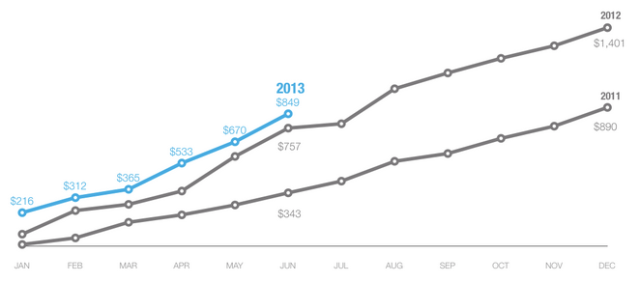Over the last few years, digital health has emerged as a market rife with opportunity, and both startups and investors are beginning to take notice. Investments in digital health startups doubled from 2009 to 2011, for example, and that growth continued to accelerate throughout much of 2012. But fast forward to today, and, while the space continues to move forward and investors remain optimistic, the digital health narrative is no longer quite so black-and-white.
This week, San Francisco-based startup accelerator Rock Health released its mid-year report on the state of the industry, and, while digital health funding rose 12 percent in the first half of 2013, for the first time, the market showed signs that its growth is beginning to slow. Though Rock Health’s reports (and data) are by no means complete, they do give an increasingly accurate look at trends evolving within digital health, especially among startup investors.
To break it down: For the first six months of 2013, the report found that 90 digital health startups received a total of $849 million in funding, representing a 12 percent increase in the amount of capital invested and a 25 percent increase in deal volume compared to the same period last year. However, while these numbers appear to indicate that growth continues unabated, compared to the market’s torrid growth rate (of 73 percent) over the same period last year, it appears that the flow of capital into digital health has actually begun to decelerate.
That being said, there is a silver lining given that this deceleration is somewhat reflective of what’s going on across the map. For instance, during the first quarter, venture investments across all sectors dropped 6 percent compared to the same period last year, and, more locally, venture funding in traditional healthcare continues to drop. Medical device funding and biotech, for example, fell by 29 percent and 2 percent, respectively.
So, ultimately, while digital health may be entering a period of deceleration, there’s still reason to be optimistic, and as we move forward, an increasing share of the venture capital that has been reserved for traditional healthcare investments could begin to move into digital health. What’s more, Rock Health found that investors have done more deals in digital health this year than in 2012, and the report points to an increasing awareness among investors of the market opportunities beginning to emerge in the digital health market.
David Shaywitz of Forbes points out, for example, that venture firms are slowly beginning to increase the number of partners dedicated to investing in digital health and that both federal and academic activity have begun to increase as well.
Overall, the report found that 146 investors participated in one or two deals in 2013, a healthy uptick from the 92 firms that invested in digital health over the same period last year. What’s more, a handful of firms became particular active in the market this year, with Social+Capital Partnership leading the way among all firms with five digital health investments, followed closely by Norwest Venture Partners.
On the other hand, like any emerging and active space, while investors are beginning to pay attention, they’re still doing more dabbling than actual investing. Rock Health co-founder Halle Tecco attributes this to the fact that the prevailing perception among investors seems to be that it’s still a little too early to be making any major commitments to digital health. It’s much the same story that one finds in the education technology space as well.
What’s more, for investor to begin making major commitments en masse, digital health startups are going to need to demonstrate more differentiation going forward. While startups have been flooding into the space over the last few years, there are a lot of me-too and copycat businesses out there, and we haven’t yet seen the big results that have been promised in all the hoopla over digital health’s potential. To that point, a few big exits would go a long way to encouraging investors that are still sitting on the fence that it’s time to get into the game, but thus far, those head-turning exits are still absent.
Rock Health’s report also identifies another important (and telling trend) in digital health: While an increasing number of startups matured to series C-level deals during the first half of the year, digital health investment continues to skew towards later-stage deals. And, while wealthy individuals have begun to back health startups with increasing frequency, experienced, veteran angels investors remain in short supply.
“While the tech sector has companies like Google, Facebook and eBay/PayPal, which have spun off dozens of active angel investors, we still haven’t seen ‘the Facebook of digital health,’” Tecco tells us. The emergence of a handful of key players in the market — or a few billion-dollar success stories — would go a long way towards creating “an active angel pool that could help support the next generation of entrepreneurs” and offer exit opportunities to fledgling startups, she says.
Early employees and executives at the biggest tech companies have gone on to become active angel investors in related verticals, contributing to the overall success of their respective markets. As a result, it seems that, not until the first generation digital health startups — more mature and well-capitalized players like Practice Fusion or Castlight, for example — go public or get acquired for big dollars, will we see that new generation of angel investors.
Perhaps unsurprisingly, given the dearth of seed and angel investors in digital health, Rock Health found that startups have increasingly begun to turn to alternative sources of capital, like crowdfunding platforms. For entrepreneurs, especially those building companies with hardware components, crowdfunding is becoming an attractive option, the report explains, with 38 digital health campaigns having raised over $4.5 million across Indiegogo, Kickstarter, Medstartr and Fundable in 2013.
Indiegogo, for example, has seen the number of health-related campaigns skyrocket by 2,279 percent in 2013, while AngelList identified a 272 percent increase in the number of health startup profiles created on its platform this year.
Furthermore, when one considers the uptick in general health-related campaigns, the move towards crowdfunding increasingly appears to be an industry-wide trend. Both for digital health startups and for people turning to crowdfunding platforms to help pay medical bills or cover the cost of surgery, for example. The majority of general crowdfunding platforms, like Rally.org, Fundly and GoFundMe, to name a few, have recently seen health and medical fundraisers become their fastest-growing category.
GiveForward, an online fundraising platform for medical bills, recently surpassed $50 million in medical contributions on its platform, 70 percent of which came in the last 12 months. Given how quickly the space has begun to move forward, says co-founder Ethan Austin, the company expects to see that figure increase to $120 million over the next year.
What’s more, when TechCrunch recently asked Crowdtilt co-founder James Beshara if the “group-funding” platform had been seeing similar data, he told us that health and medical “has definitely been one of [Crowdtilt’s] fastest-growing categories.” In November, these campaigns represented 3 percent of the total dollars raised on the crowdfunding platform and, by April, they had increased to 16 percent of total dollars, Beshara says.
That being said, thus far, it seems that the majority of health-related crowdfunding activity has been taking place on general crowdfunding sites, and not necessarily on health-specific platforms. However, while the class of dedicated crowdfunding portals remains fairly small, its numbers are growing. As they begin to proliferate and inevitably help to mint a few winners, there’s no doubt that this will begin to encourage more angel investors and seed-stage funds to jump on the digital health bandwagon.
For now, crowdfunding portals seem to be carrying the weight, but over time, that may change, as more investors begin to take a cue from veterans like Esther Dyson.
For more, check out Rock Health’s full mid-year report in slide form below:































Comment